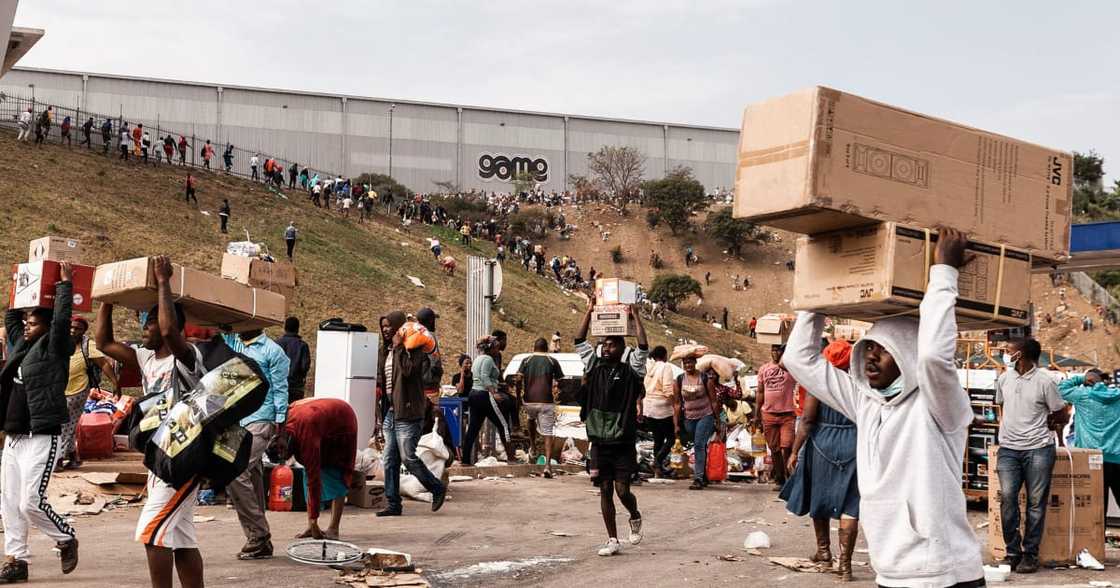July Unrest: Concerns Over More Unrest Arise as Government Tries to Heal Communities Impacted by Violence
- On 9 July 2021, South Africa was rocked with widespread protests that led to the destruction of property and looting
- The riots were sparked by the Constitutional Court sentencing former President Jacob Zuma to 15 months in prison
- Briefly News takes a look at who is blamed for the unrest and what the government has done to prevent such riots a year later
It has now been over a year since South Africans watched people in parts of the Gauteng province and KwaZulu-Natal tear up shopping centres, malls and small businesses in what was initially described as a protest against former President Jacob Zuma's arrest. It was almost an instantaneous act, however, looking back, the build-up to the unrest started a week prior.

Source: Getty Images
For the first time in South African history, the Constitutional Court sentenced former president Jacob Zuma to a 15-month prison sentence for being in contempt of court on 29 June. The sentence came after Zuma failed to appear at the Zondo Commission.
What happened in the week before the July unrest?
Zuma and his supporters were in disbelief and believed that the sentence was unjust and they were prepared to fight against ConCourt's judgement. On 30 June, Msholozi's supporters headed to his Nkandla homestead in KwaZulu-Natal.
PAY ATTENTION: Follow Briefly News on Twitter and never miss the hottest topics! Find us at @brieflyza!
The numbers were small at first, however, by 4 July, hundreds of people, some with guns, were waiting outside Zuma's home in what was called a "human shield" by the BBC to prevent police from taking him away.
The police were criticised for merely observing the events outside Zuma's house as many people were breaking the law by waving their guns in the air. Police Minister Bheki Cele defended the police's decisions not to act or arrest people outside Zuma's home, saying it would have caused chaos and the goal was to keep the peace.
In later interviews, Cele claimed that the police took images of the people with guns and said they would be later arrested.
Zuma was expected to hand himself over to the police by Wednesday, 7 July 2021, to begin serving out his sentence. If he had failed to hand himself over, a warrant of arrest would have been issued.
The former president eventually caved in and handed himself in late Thursday night on 8 July, which gave rise to one of the biggest protests in SA history the following day.
Why is the security cluster blamed for the July unrest?
Many parties are being blamed for the unrest. However, the police have received the bulk of the blame. Many experts feel that the police, in so many instances, failed to act way before the actual unrest began, and that set the tone for the week of destruction and looting.
The former National Police Commissioner Khehla Sitole and Cele's beef was also named as one of the reasons the police did not act the way they were supposed to by stopping protestors from looting businesses.
During the South African Human Rights Commission (SAHRC) hearings into the July unrest, it was clear that the mismanagement of the police came from the top, reports News24.
Sitole was unable to recall how many people were killed in the Phoenix massacre and later admitted that he never even set foot in the community after 37 people were murdered by vigilantes who claimed to have been protecting their malls from being looted.
Cele, at some point, admitted that the police were not trained to handle riots as big as the July unrest. They were outnumbered and did not have enough weapons to deal with the events, which lasted about a week.
The security cluster as a whole was also blamed for the slow action to stop the unrest because communication between the different divisions was delayed and almost non-existent.
South Africans watched in real-time as the former National Defence Force Minister Nosiviwe Mapisa-Nqakula said an intelligence report was handed over to the police minister's office, with Cele later denying ever receiving the report. Cele and Sitole were also unable to work with each other, and it was clear that they were not sharing intelligence information.
Had the security cluster worked together and stopped demonstrators much earlier, businesses would not have suffered as many losses.
Where are the July unrest instigators?
Zuma heading to prison seems to have been the catalyst for the July unrest. President Cyril Ramaphosa and Police Minister Bheki Cele have been singing the tune that the unrest was planned, and at least 12 people were identified as the instigators.
A year later, the alleged instigators have not been arrested yet, with the exception of former Ukhozi FM radio personality Ngizwe Mchunu, who is said to be one of the instigators, according to News24.
During the SAHRC hearings, Hawks head General Godfrey Lebeya stated that only seven people have been charged for inciting violence and those matters have been brought to the courts.
Lebeya added that the Hawks had 12 matters that were still at the inquiry stage but gave no indication of how many people are suspected of being part of the instigators.
The other arrested include people who were caught during the riots and those identified to have been part of the Phoenix massacre, but the real masterminds of the havoc seen in SA are still unknown to the public.
What was the real cause of the July unrest?
During SAHRC hearings, Police Minister Bheki Cele denied that the July unrest had anything to do with the widespread hunger and poverty in the country and said it was merely a failed insurrection.
Cele stated that the unrest in Gauteng and KZN was planned and organised on social media platforms such as Twitter and open WhatApps groups. The minister alleged that the were three components to the unrest, namely, targeted selection, extensive looting by people from informal settlements near malls and warehouses and attacks on important interprovincial arterial roads.
According to Sandy Africa, Associate Professor in Political Science at the University of Pretoria, the idea that the July unrest was planned by a group of people who are now somewhat untouchable leaves out the reality that the climate in South Africa at the time was already volatile, reports The Conversation.
Service delivery protests in many parts of the country are an everyday reality, and with frustrations over the current state of many people living in poverty and, taking that into consideration, Zuma's arrest was simply the trigger.
South Africa's high unemployment rate could have been another factor that led people to loot businesses, seeing how many people have been failed by the government.
Africa noted that there are growing seeds of discontent in South Africa, and that is reflected in the occasional blockades of national roads, the constant threats of a national shutdown and the purposeful destruction of infrastructure.
Will the July unrest ever happen again?
Africa noted that if South Africa's social issues are not fixed, then it is reasonable to believe that another event like the July unrest could be seen in the future.
The UP professor stated there are new factors contributing to insecurity in the country, such as devasting floods in KZN and other parts of SA, unemployment, and now water shortages in some areas.
Africa further stated that the violent attitudes toward foreign nationals could spark another event because the messaging around the discontent for foreigners seems to come out of the July unrest playbook. She added that there are now untraceable videos being posted on social media to drive an agenda against foreigners.
Additionally, Russia's invasion of Ukraine is another contributing factor because it has impacted food and energy security and this is particularly hard-hitting people who were already impoverished.
Lloyd's of London, a United Kingdom-based reinsurer, has upped premiums paid by the South African Special Risk Association (Sasria) because of the concern that more unrest could take place.
An estimated R50 billion worth of damages were calculated, and now Saria says it will not be able to pay out all claims, according to BusineessTech.
Sarisas stated that Lloyd's hiked premiums 10-fold, and if Sarisa fails to payout claims to companies such as the Shoprite Group, Foschini group and others, these companies could choose to disinvest in South Africa. This could have a knockdown effect on South Africa's economy.
Stuart Mbanyele, a researcher in the governance delivery and impact programme at Good Governance Africa, also shares the same opinion about a reoccurrence of the riots, reports the Mail & Guardian.
What has government done to prevent another July unrest?
President Cyril Ramaphiosa made the decision to move the State Security Agency into the Office of the Presidency following the July unrest as a means to directly be in charge of state security.
This was a significant move considering that the SSA was criticised for not functioning optimally. Qualified people were also hired in prominent positions in the SSA to combat the weaknesses in the agency.
Ramaphosa also asked Khehla to resign from his position and hired Fannie Masemola to replace him.
Ramaphosa also reshuffled his cabinet which saw Mapisa-Nqakula becoming the Speaker of the National Assembly and Minister Thandi Modise taking over as the head of the Department of the National Defence Force.
In response to the low police numbers, Cele stated during a national security cluster on the July unrest that the South African Police Service will hire 4 000 new officers in this financial year, and 10 000 recruits will be trained.
Cele also stated that his department is also working toward monitoring the revitalisation of Community Policing Forums (CPF) and an additional budget has been allocated for this purpose.
The government has also worked toward healing communities that were impacted by the unrest. A few Restorative Justice Community Dialogues have been held in affected areas such as Phoenix.
These dialogues were used to educate communities about human dignity, equality, non-racialism, non-sexism, the supremacy of the Constitution and the importance of upholding the rule of law.
What's next for South Africa?
Experts are clear that South Africa would need to rebuild to prevent another unrest of the same magnitude seen last year. UP Associate Professor Sandy Africa says that the African National Congress will need to fix its factional battles as a start.
Africa stated South Africans now want justice and accountability from the government and they are tired of weak governance, political dysfunction, and economic inequality. She added the country needs a better security sector that is effective, accountable and serves the SA's democracy.
July Unrest: Protests, looting, and violence, businesses in KwaZulu-Natal still rebuilding a year later
Briefly News previously reported that almost a year ago, KwaZulu-Natal and parts of Gauteng were thrown into chaos when unrest descended that led to violence, looting and deaths.
Several businesses are still rebuilding, and others have closed their doors, causing more unemployment in the already besieged economy.
KwaZulu-Natal Premier Sihle Zikalala said in an interview with SABC News that the anniversary of the unrest brings back memories of several people killed. A year later, he said plans are in motion to reconstruct the economy. Zikalala said a number of factories and warehouses were destroyed and that several businesses are opening up and getting back into operation.
PAY ATTENTION: Сheck out news that is picked exactly for YOU ➡️ find the “Recommended for you” block on the home page and enjoy!
Source: Briefly News

